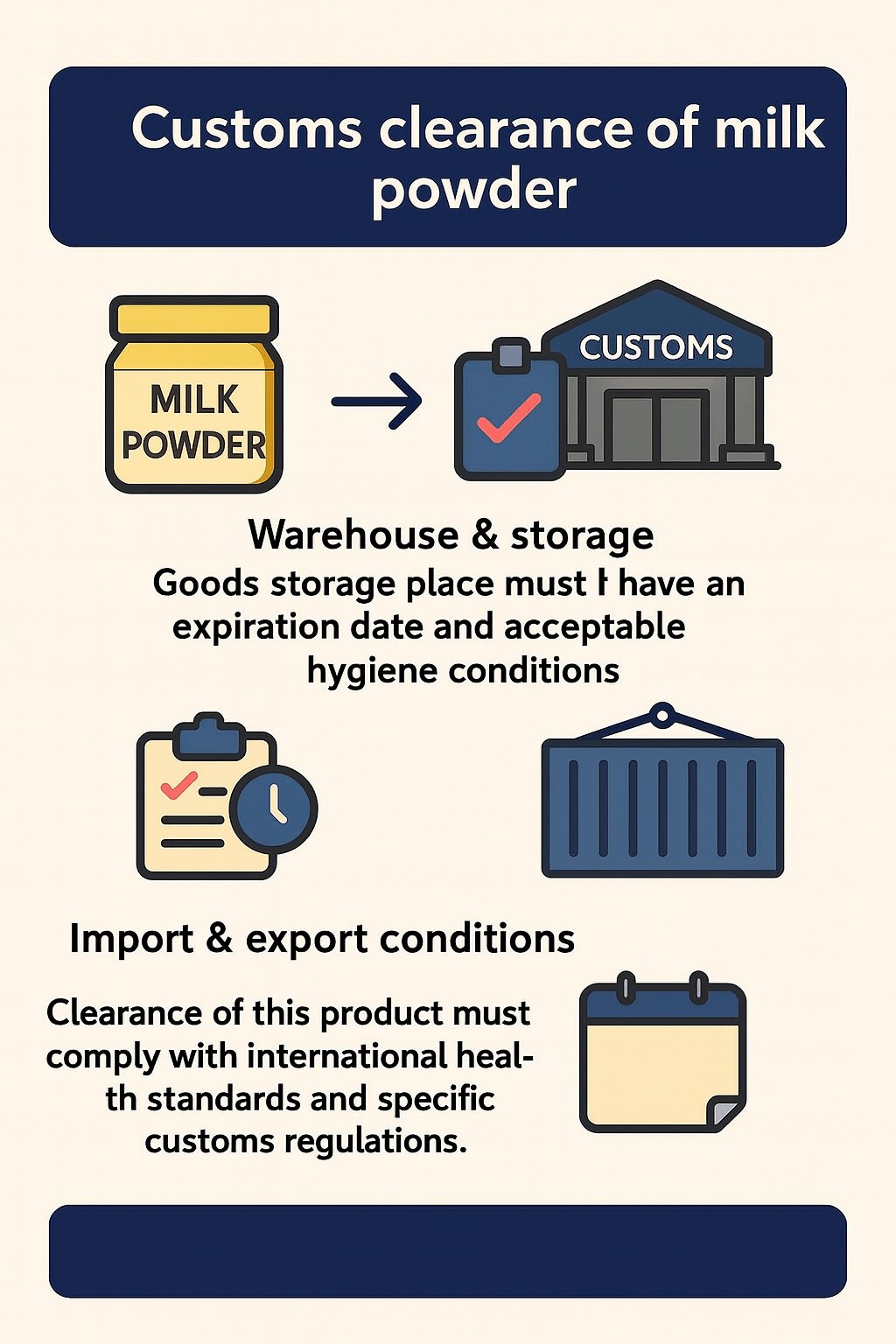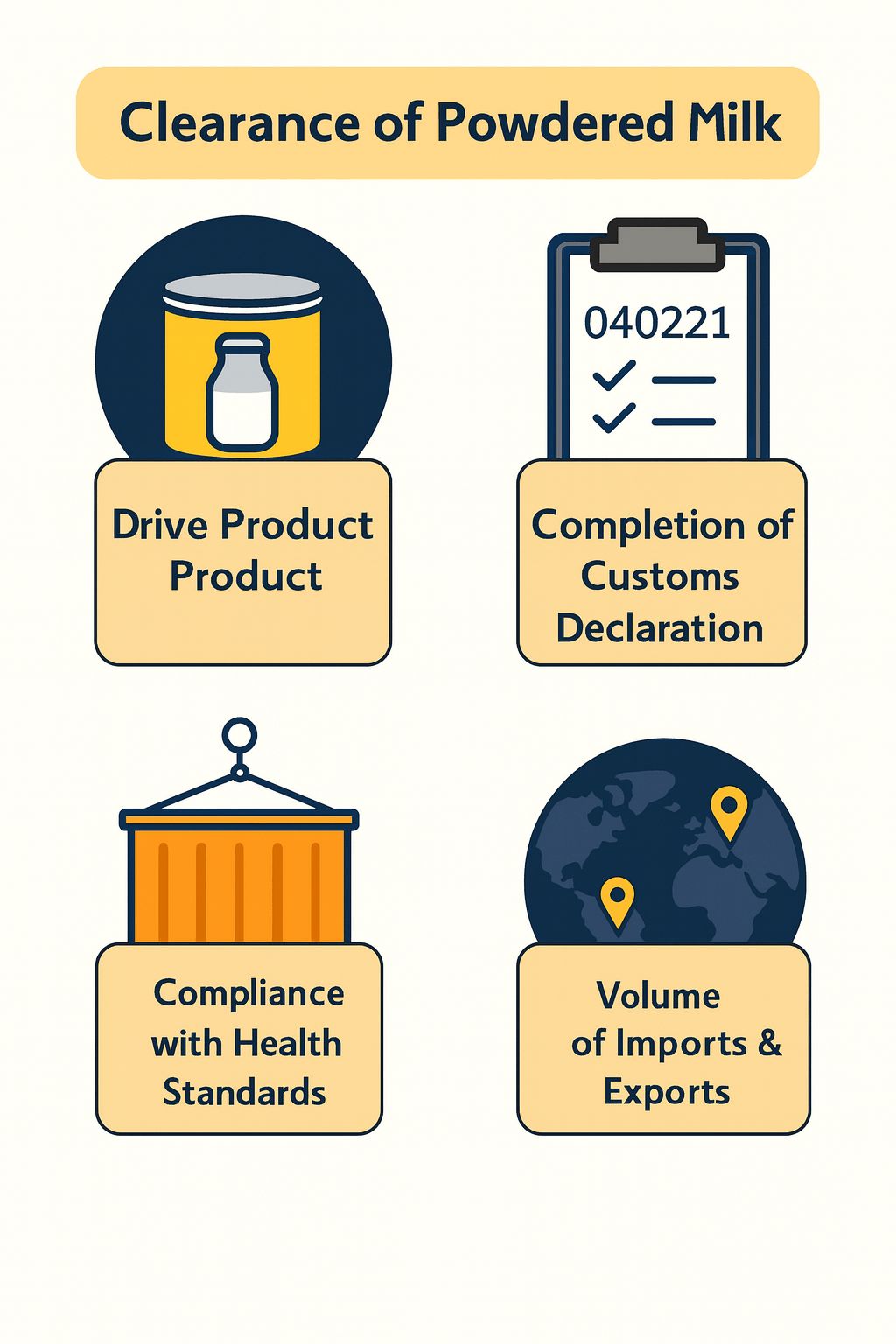Milk Powder Customs Clearance in Iran (HS Code + Documents and Permits)

For estimating the time and cost of milk powder clearance, contact the Saba Tarkhis experts.
Instant Free Consultation1) Customs Tariff and HS Code for Milk Powder
| Product | Short Description | HS Code |
|---|---|---|
| Skimmed Milk Powder | Skimmed milk powder (Fat 0%) | 040210 |
| Full Cream Milk Powder (with fat) | Full cream milk powder | 040221 |
Exact classification can vary depending on fat percentage, formulation, origin, and preferential agreements.
2) Special Conditions for Import and Export of Milk Powder
Compliance with international sanitary standards
Quality testing
Storage conditions during transportation
Expiry date
3) Volume of Milk Powder Imports and Exports to Iran
4) Global Circulation of Milk Powder Trade
5) Milk Powder Exporting and Importing Countries
- New Zealand: Known as the largest milk powder exporter in the world, exporting large quantities to Asian and Middle Eastern countries.
- Netherlands: One of the largest producers and exporters of milk powder to the European Union and other countries.
- Ireland: With a powerful dairy industry, it exports substantial quantities of milk powder to other countries.
- Germany and France: These two European countries also hold a special position in milk powder production and exports.
6) Required Documents for Milk Powder Clearance
- 1. Commercial Invoice
The commercial invoice is one of the most important documents to be submitted during clearance. It includes complete information about the goods, such as milk powder type, weight, quantity, and price. The buyer and seller names and addresses, payment terms, and mode of transport are also stated. The commercial invoice is used as the primary document for customs valuation and duty calculation. Any error in this document can lead to clearance delays. - 2. Packing List
The packing list details the packaging information. It specifies the number of packages, net and gross weight of each package, dimensions, and packaging type (box, bag, etc.). This information helps customs match the physical inspection with the declared information and identify any discrepancies. - 3. Bill of Lading
Issued by the carrier, the bill of lading covers transport information. It includes origin and destination, carrier name, mode of transport (sea, air, road), and cargo details. The bill of lading is recognized as the document of title and is essential for customs clearance. It also provides precise details on timing and transport conditions. - 4. Health Certificate
As a sensitive food product, milk powder requires a health certificate issued by health authorities in the exporting country. This certificate indicates the product’s safety and quality and confirms compliance with relevant sanitary standards. Submission of this certificate is mandatory for importing food products like milk powder; without it, the consignment may be seized or prevented from clearance. - 5. Certificate of Origin
This document shows in which country the milk powder was produced. Issued by the chamber of commerce of the producing country, it is vital for determining customs tariffs and benefiting from tariff reductions under trade agreements. It helps customs apply tariff rules correctly based on origin. - 6. Import Permit from the Food and Drug Organization
For importing milk powder to Iran, one of the main requirements is obtaining a permit from the Food and Drug Organization. Due to sanitary sensitivities and quality control, this permit is essential and must be obtained before the goods enter the country. Products like milk powder that are directly used for human consumption require this permit, and clearance is not possible without it. - 7. Standard Certificates (ISO or HACCP)
As a product used in the production and supply of food and pharmaceutical items, milk powder must be produced and packaged in accordance with international standards such as ISO or HACCP. These certificates ensure that the production process is under appropriate sanitary and quality oversight and that the final product is free from contamination or sanitary issues. Some countries place strong emphasis on presenting these certificates for importing food products. - 8. Other related documents (if required)
Depending on the consignment type and import conditions, other documents may also be required. These can include certificates of sanitary and quality tests, cargo insurance, and documents related to international transport. If the milk powder consignment is insured, providing the insurance policy is also considered a necessary document for clearance.
Need accurate HS codes, testing, and sanitary permits? Our team manages the dossier end-to-end.
Submit a Pro Forma Request
Frequently Asked Questions
What is the HS Code for milk powder?
As per your text: skimmed milk powder under 040210 and full cream milk powder under 040221; correct selection is vital for the declaration.
What permits are required to import milk powder?
A permit from the Food and Drug Organization, along with documents such as the invoice, packing list, bill of lading, health certificate, certificate of origin, and where needed standard certificates (ISO/HACCP) and cargo insurance.
What are the key considerations for transporting and storing milk powder?
Maintaining proper temperature, using temperature-controlled containers (cold chain), and paying attention to expiry dates to prevent quality loss and shipment rejection.
Specialized Customs Services by Saba Brokerage
As one of the most experienced and prominent customs brokerages in Iran, Saba Brokerage offers special services for clearing sensitive goods such as milk powder. These services include:
Pre-import specialized consulting: Our professional experts provide precise and specialized consulting to help importers choose the right customs tariffs and required documents, preventing potential problems and extra costs during import and clearance. This consulting covers the process from start to finish.
Accurate preparation and compilation of documents: All documents required for milk powder clearance are prepared and compiled by our team with full accuracy and in accordance with international standards and Iran’s customs regulations. This accuracy ensures the clearance process proceeds without any delay.
Obtaining necessary permits: Given the sensitivities of importing milk powder, sanitary permits from the Food and Drug Organization are essential. Our team obtains all required permits swiftly and in the shortest possible time to prevent any clearance delays.
Rapid, real-time follow-up: A key advantage of our services is real-time follow-up and precise client updates. Importers can access up-to-the-minute status on their clearances to identify and resolve any issues promptly.
Time and cost savings: By leveraging our specialized services, importers can reduce time and extra costs during clearance. Our experienced, professional team ensures goods are cleared as quickly as possible with minimal costs.
Using these services assures importers that the milk powder clearance process is performed completely and optimally, with confidence in the safety and quality of their goods.
.png)
